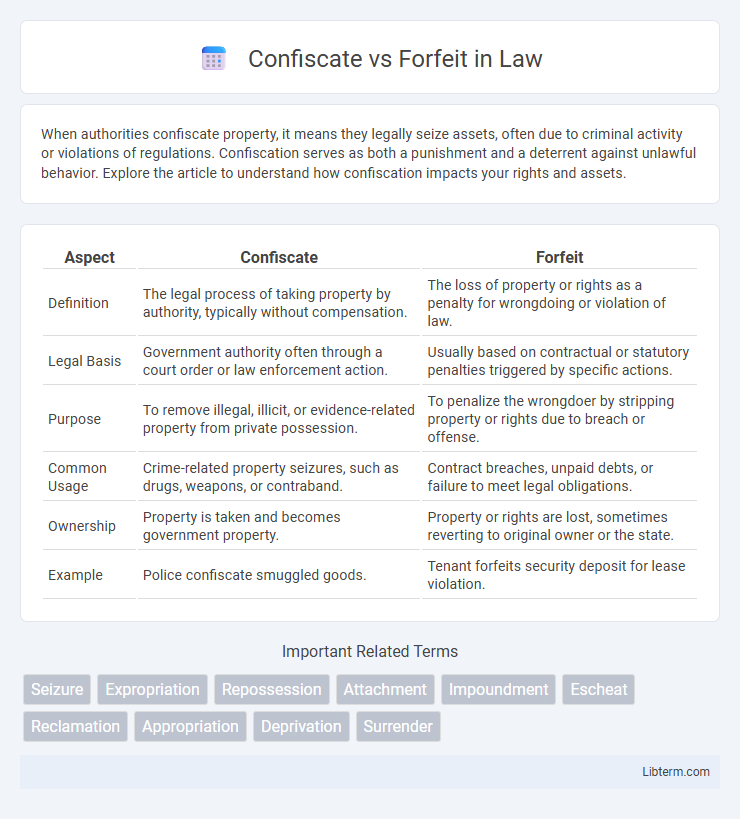When authorities confiscate property, it means they legally seize assets, often due to criminal activity or violations of regulations. Confiscation serves as both a punishment and a deterrent against unlawful behavior. Explore the article to understand how confiscation impacts your rights and assets.
Table of Comparison
| Aspect | Confiscate | Forfeit |
|---|---|---|
| Definition | The legal process of taking property by authority, typically without compensation. | The loss of property or rights as a penalty for wrongdoing or violation of law. |
| Legal Basis | Government authority often through a court order or law enforcement action. | Usually based on contractual or statutory penalties triggered by specific actions. |
| Purpose | To remove illegal, illicit, or evidence-related property from private possession. | To penalize the wrongdoer by stripping property or rights due to breach or offense. |
| Common Usage | Crime-related property seizures, such as drugs, weapons, or contraband. | Contract breaches, unpaid debts, or failure to meet legal obligations. |
| Ownership | Property is taken and becomes government property. | Property or rights are lost, sometimes reverting to original owner or the state. |
| Example | Police confiscate smuggled goods. | Tenant forfeits security deposit for lease violation. |
Definition of Confiscate
Confiscate refers to the legal process by which authorities seize property or assets, often due to illegal activities or violations of laws. This action typically involves government or law enforcement taking possession of items without compensation to the owner. Unlike forfeiture, which implies a voluntary loss or penalty resulting from a specific offense, confiscation generally denotes an involuntary and authoritative seizure.
Definition of Forfeit
Forfeit refers to the loss or giving up of something, especially as a penalty for wrongdoing or failure to fulfill an obligation. Unlike confiscate, which implies an authoritative seizure by a government or official body, forfeit emphasizes the compulsory surrender due to legal or contractual breach. The concept of forfeit commonly appears in legal contexts involving property, rights, or privileges that are voluntarily or involuntarily relinquished.
Legal Contexts: Confiscate vs Forfeit
Confiscate refers to the legal process where authorities seize property or assets due to illegal activity or violation of laws, typically without compensation to the owner. Forfeit involves the loss of rights or property as a penalty for breaching a legal obligation, often predetermined by statute or contract terms. Both terms are crucial in criminal and civil law, delineating how assets or rights are surrendered under judicial or administrative orders.
Key Differences Between Confiscate and Forfeit
Confiscate refers to the legal act of seizing property by authorities, often as a penalty for wrongdoing or illegal activity, whereas forfeit involves the loss of rights, property, or privileges as a consequence of failing to meet legal or contractual obligations. Confiscation is typically executed by government agencies and is permanent unless reversed by a court, while forfeiture can be voluntary or automatic, depending on the terms breached. The key difference lies in confiscation being an enforced seizure tied to law enforcement, whereas forfeiture centers on the loss incurred due to non-compliance or violation.
Examples of Confiscation in Practice
Confiscation occurs when authorities legally seize property due to its connection to criminal activity, such as law enforcement confiscating counterfeit goods during a raid. Real-world examples include the government confiscating illegal firearms from a suspect or customs officials seizing smuggled drugs at a border checkpoint. Unlike forfeiture, confiscation often involves immediate physical seizure without compensation to the owner.
Examples of Forfeiture in Practice
Forfeiture commonly occurs in legal contexts where assets tied to criminal activity are surrendered, such as vehicles seized during drug trafficking investigations or properties auctioned after money laundering convictions. Tax authorities often forfeit bank accounts linked to evasion or fraud without compensation to the owner. In civil law, forfeiture can result from contractual breaches, exemplified by security deposits forfeited due to tenant violations.
Government Authority: When Is Property Confiscated or Forfeited?
Property is confiscated by government authority when it is taken as a penalty for involvement in criminal activity or illegal conduct, often without compensation to the owner. Forfeiture occurs specifically when property is surrendered or lost due to legal process tied to violations of laws, such as drug trafficking or fraud, and the government gains control over the assets. Confiscation typically implies punitive action, while forfeiture is a legal mechanism used to remove the power or ownership of property connected to unlawful acts.
Rights and Protections for Property Owners
Confiscate involves the government seizing property without compensation, often due to legal violations or criminal activity, directly impacting property owners' rights by removing ownership forcibly. Forfeit occurs when property is surrendered or lost as a penalty for failing to meet legal conditions, typically including some procedural protections like notice or hearing to safeguard owners' rights. Both processes can diminish property protections but forfeiture usually provides more legal safeguarding mechanisms compared to outright confiscation.
Common Misunderstandings: Confiscate vs Forfeit
Confiscate often implies the government or authority taking property as a penalty or for legal reasons, whereas forfeit involves losing rights or possessions due to failure to meet legal obligations or conditions. A common misunderstanding is that confiscate and forfeit are interchangeable, but confiscation is typically involuntary and punitive, while forfeiture can arise from contractual breaches or defaults. Clarifying this distinction helps avoid confusion in legal contexts involving property rights and penalties.
Conclusion: Choosing the Right Term
Choosing between "confiscate" and "forfeit" depends on the context of legal ownership and the nature of authority involved. Confiscate implies a deliberate act by an authority to seize property due to illegal activity or violation of laws. Forfeit refers to the loss of rights or property as a penalty often stipulated by law or contract, emphasizing the consequence rather than the act of seizure.
Confiscate Infographic

 libterm.com
libterm.com